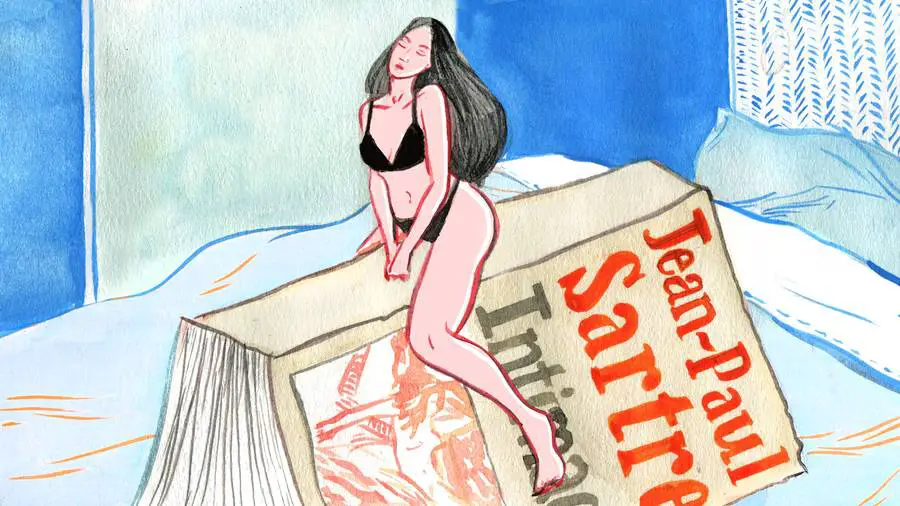It’s hard to say how long sapiosexuality has enjoyed buzzword status. Vaguely defined as sexual attraction to intelligence, the earliest Urban Dictionary reference to the word dates back to 2002, but subsequent entries remain pretty sporadic until about 2014. Meanwhile, the OED has yet to give the term any official nod, and as I write this, Microsoft Word is pretty adamantly voicing its objection with the infamous red squiggle.
Even as a middle schooler back in the latter half of the aughts, however, I remember having some familiarity with the concept, which was a godsend to a nerdy, pre-contacts sixth-grader completely convinced that boys didn’t like smart girls. Back in those days, sapiosexuality was more of an oddity, a Snapple-status fun fact that came up in those same conversations where someone asked, “Did you know there’s a word for being scared of peanut butter sticking to the roof of your mouth?”

Ten years and a few letters of LGBTQIA+ later, and society has decided it’s time to bring sapiosexuality out of PG-13 Snapple Fact territory and grant it the ever-coveted “it’s like a real thing” status. And who better to bring a new sexuality into the light of wokeness (wokefulness?) than “Cosmo”?
In an article last month, Sex and Relationships editor and Twitter personality Carina Hsieh took on the challenge, interviewing six anonymous twenty-somethings about their experiences as self-identified sapiosexuals. The result? Six arrogant straight people talk about how not arrogant they are for caring more about intelligence than looks. While Hsieh herself maintains that “Sapiosexual isn’t just a buzzy word popping up on people’s OkCupid profiles, it’s a real thing,” I somehow get the sense that she’s not quite convinced either.
Stop Trying to Make Sapiosexual Happen
It’s not going to happen. In 2017, it may seem archaic, if not dangerously intolerant, to invalidate someone’s sexual identity. However, in a time where so many people are coming out, embracing different identities and bringing new sexualities to light, it is even more important to avoid the kind of overreach that could push the movement and its recent developments into skeptical or even satirical territory.
As one interviewee notes in the article, not even other LGBTQIA+ individuals are necessarily on board with sapiosexuality joining the team. “Woman C,” an anonymous twenty-three-year-old self-identified sapiosexual, relays an experience in which a conversation about her sexuality with a pansexual friend turned sour: “Once I told my friend who is pansexual that I am a sapiosexual. She hadn’t heard of it, so I explained what it is and she literally rolled her eyes at me and said ‘everyone likes smart people.’ I feel like people just think it’s a really obnoxious way of saying you like smart people, but it’s much more intense than that–more like a fetish.”
What “Woman C” misses is that her very defense of sapiosexuality is precisely what undermines its claims to legitimacy: It’s “more like a fetish.”
In fact, even “fetish” is a strong word to attribute to an attraction to a relatively common and understandably appealing quality in others. Admiring or seeking out particular qualities in a partner does not a sexuality, or a fetish, make. It’s called having turn-ons.
Gentlemen Prefer Brains
There’s really no substantial difference between being attracted to intelligent people and being attracted to blondes. Or brunettes, tall people, short people, mixed-race people, what have you. It’s just a preference. It may even be an overwhelmingly strong preference, but unless the preferred quality is, say, someone having a penis, it’s not a sexuality.
Of course, as all six respondents are sure to emphasize, sapiosexuality differs from other mere turn-ons in that the object of attraction is not an aesthetic or otherwise physical quality. Rather, sapiosexuals dedicate themselves to the oh-so-noble endeavor of valuing what’s on the proverbial inside.
The issue here is that lots, if not most, people are attracted to personality traits that may or may not be weighted above or below physical qualities depending on the individuals in question. How many times have you heard a girl say that she wants a guy with a good sense of humor? Some people really care that their partner is ambitious. Others are really attracted to people that are family oriented. Or artistic. Or literally any other endless list of non-aesthetic, non-physical personality traits.
The bottom line is, everyone is attracted to a variety of different qualities, both physical and otherwise. Weighting any one of those particular qualities above or below any other does not necessitate an entirely new sexuality. That would be confusing, unnecessary and, well, ridiculous.
We’re Here, We’re (Not Really) Queer
That said, it is 2017 after all. Surely everyone can agree that sexuality is a personal and complex thing, and any individual has the right to define and label their own sexual identity as they see fit.
The issue, however, is that even in 2017, this of course is not reality. For all the strides the LGBTQIA+ community has made in recent decades, they still face opposition, discrimination and skepticism. Popularizing such very specific–and perhaps somewhat overreaching–sexual preferences as new sexual identities runs the risk of aggravating this skepticism, opening the movement and its community up to increased ridicule.
Creating such specific sexual identities reinforces an unfortunate but pervasive narrative still present in anti-LGBTQIA+ rhetoric that holds that people who do not conform to heteronormative expectations are “just seeking attention.” Problematic as this mentality is, declaring a specific and relatively accepted sexual attraction to be its own sexual identity reinforces this criticism, leaving the rest of the community even more vulnerable to these allegations.

Moreover, choosing to align yourself with a historically oppressed community almost seems to be a kind of cultural appropriation. For centuries, non-heterosexuals have endured persecution, discrimination and even death for their sexuality. Unless maybe you’re in some kind of “High School Musical” scenario where you’re the school’s reigning jock and your friends don’t want you to date a mathlete, you’re probably not suffering just because you’re attracted to smart people.
Sorry, sapiosexuals, but you’re not getting an S in LGBTQIA+ any time soon. There are already too many consonants anyway. If anything, it needs more vowels so it can become a pronounceable acronym. Honestly, a U would be very helpful.


















[…] plain pointless. An article from Study Breaks declares that sapiosexual people are just arrogant. https://studybreaks.com/2017/05/15/sapiosexuality/ Being a sapiosexual or sapiophile means that the person is attracted to intelligence above all […]
[…] plain pointless. An article from Study Breaks declares that sapiosexual people are just arrogant. https://studybreaks.com/2017/05/15/sapiosexuality/ Being a sapiosexual or sapiophile means that the person is attracted to intelligence above all […]
[…] plain pointless. An article from Study Breaks declares that sapiosexual people are just arrogant. https://studybreaks.com/2017/05/15/sapiosexuality/ Being a sapiosexual or sapiophile means that the person is attracted to intelligence above all […]
[…] plain pointless. An article from Study Breaks declares that sapiosexual people are just arrogant. https://studybreaks.com/2017/05/15/sapiosexuality/ Being a sapiosexual or sapiophile means that the person is attracted to intelligence above all […]
[…] since it rose to prominence. The Daily Beast deemed it pretentious and a writer for the website Study Breaks called it arrogant. Yet, as more dictionaries acknowledge the word, the more legitimate sapiosexuals have become — […]